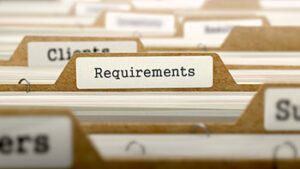
There’s one word all experienced landlords have come to fear: eviction.
Nothing is worse for a landlord than going through the long and expensive process of evicting a tenant. Many landlords hope to avoid this nightmare by performing an eviction records search on their potential tenants. But, how do you make sense of the results for someone who has never looked at eviction records?
According to TransUnion, the total eviction-related expenses for property managers averages $3,500. Unfortunately, that’s money that could have been in your pocket had you not had a tenant that broke the lease, didn’t pay rent and more.
Checking eviction history before you rent to a new tenant is a key part of choosing the right tenants who will be long-term, profitable renters. Renting to those with a long eviction history will cause more grief, so learning how to avoid that situation is essential.
In this post, we’ll review how to examine an eviction report, where to find eviction records and more.
A Table Of Contents For How To Find Eviction Records
- Why Is An Eviction Record Search Necessary?
- How To Look Up Evictions
- For Tenants: How To Check If You Have An Eviction
- How To Look Up Evictions FAQs
- Choose Your Tenants Carefully
Why Is An Eviction Record Search Necessary?

Before we get into the details of how to check eviction history, you may still be curious about why this check is necessary.
Simply put, people tend to have patterns of behavior. If a tenant has been evicted from a property one time before, this shows that they may find themselves in the same situation again in the future.
If they’ve been evicted multiple times, you can be all-but-sure that they will be a difficult tenant to work with.
Eviction only occurs in the most serious of cases. There are times when a tenant does so much damage to property or simply refuses to pay their rent, and those are the times when an eviction occurs.
If a potential tenant has a history of eviction, you will want to consider their profile much more carefully before even considering renting. If you don’t, you’ll be putting yourself and your business at risk.
What’s Included In An Eviction Report?
An eviction records search results will include basic information about the filing. The record will consist of the defendant or the tenant’s full name, the name of the plaintiff or property owner, the address of the property, the dates that the eviction was filed, the location of the court the eviction was filed with as well as the outcome of the eviction proceedings.
At RentPrep, we ensure that any eviction record that returns from a search matches the correct applicant. We verify any records that return with the name and address provided by the eviction record and compare that with the information provided by the landlord to ensure that the information in our reports is as up-to-date and accurate as possible.
How To Look Up Evictions
You must know how to look up evictions, especially when it comes to legality.
Eviction Lookup Method 1: Court Records
The most direct and thorough way to determine if a potential tenant has a eviction history is to check court records. Every state, county, and area may have different courthouses, and so it may seem impossible to find out if this tenant has ever done wrong before.
First, find your state’s website.
Court records can be searched by state. Use this resource to find your state’s website, which can be used to search court records. Each state may have multiple websites that can be checked for various home-related issues, so be sure to check each one thoroughly.
Second, search the names.
Once on the court records website, search the potential tenants’ names to find out if they have any eviction records in their past.
You will want to be sure you are thorough and check more than just the main name they gave you on their application. In addition to their currently used name, check the following names:
- Birth name
- Nicknames
- Alternate names
- Names with or without initials
- Name before or after marriage/divorce
By ensuring you check every combination of their name you can come up with, you will be able to make sure there aren’t any records you are missing.
Third, get access to the record.
While you cannot view the full record for eviction cases in every state, you can get a thorough briefing or full access in most states with this type of case.
It’s essential you actually view the eviction case. Don’t let the presence of an eviction case cause you to write off a potential tenant.
In some cases, bad landlords try to wrongfully evict a tenant, and this would still cause an eviction case to be present in the person’s history.
While learning to check eviction records, you must consider the meaning of every result you find in your search to give every tenant a balanced chance.
If you cannot view the record online or travel to the courthouse in person, call them to see if you can pay a copy fee to have a case record mailed to you.
Eviction Lookup Method 2: Hire A Third Party Service
As you can see, doing the work of finding the right courthouse, checking every name that the tenant may have used in the past, and collecting the full court information can be quite the task.
Plus, you may not know what states your potential tenant has lived in during their life!
Because figuring out how to check eviction history can be quite complicated, several services include eviction checks as part of their tenant screening services. A screening service can do a national eviction search thoroughly and effectively. The screening services often come back including credit information so you can make a comprehensive and well-informed decision about future tenants.
If you aren’t experienced or confident in your ability to research every potential tenant, it may be time to use a screening service to help you narrow down the list of maybes to find the perfect renter.
For Tenants: How To Check If You Have An Eviction

Are you a tenant hunting for an apartment? Wondering how to see if you have an eviction on record that might negatively affect your chances when applying for an apartment? Thankfully, doing this is just as easy for you as for landlords.
In fact, you can use the exact same methods outlined above to find out if you have anything negative in your rental history. Landlords use these techniques, so it makes sense for you also to use them!
The ultimate way to ensure you know how your records will show up for a landlord is to ask what screening service, if any, they use. You can then check via this same third-party service to see your record.
How To Understand Eviction Search Results
We may not be able to understand what exactly led to the eviction being filed, but we can learn the results of the court proceedings from the record. The final disposition provided on an eviction record will give us more information regarding the outcome of the eviction filing. It is important to remember that an eviction filing does not always mean that the tenant was forced to vacate the property.
Civil New Filing Vs Judgment Vs Restitution of Premises
Common dispositions, or final outcomes, include civil new filing, judgments, or restitution of premises.
When the outcome on the record is “Civil New Filing,” the case was either canceled or dismissed. There are many reasons why the eviction proceedings could have been dropped. For example, the tenant may have paid past due rent that was owed, or they have agreed with the landlord or property manager outside of court, causing the eviction filing to be dropped.
If the eviction proceedings end with a judgment, the eviction was filed in favor of the landlord. In this case, the court has ordered that the tenant must pay the landlord money for rent owed and/or for any damage done to the property.
Sometimes referred to as a default judgment, this outcome occurs when the tenant fails to appear in court or respond to the eviction summons. “Restitution of Premises” is the outcome that most landlords hope for when filing for an eviction. This means that the judge has ordered the tenant to be removed from the property and full ownership is returned to the landlord. The judge will then order the tenant to vacate the property within a given time frame.
Cons Of Running Your Own Search
If you choose to run your own eviction search, be wary of where you receive the records from. Specifically, with services that offer automatically generated reports, you’ll want to be extremely careful that the records belong to the correct person and can be legally used in the adverse action process should the results lead you to deny a tenant.
Typically, the information provided on an eviction record includes the applicant’s first and last name and the property’s address. You’ll want to ensure that your applicant is the only person who has lived at that address with that name to ensure the eviction record belongs to them. This step is crucial if the applicant has a common name.
Remembering that eviction records can only be reported within seven years of filing is also essential. Any eviction records older than 7 years cannot be used in the decision to deny an applicant.
To avoid any confusion or any potential legal trouble, we recommend using a service with FCRA screeners to search eviction records for you. At RentPrep, we hand-compile our reports to ensure that any information is accurate and is compliant with all state and federal laws. Our screeners are all FCRA certified, meaning they have the knowledge and expertise to ensure that the results in our reports can legally be used in the decision-making process.
How To Look Up Evictions FAQs
Are Evictions Public Record?
Yes, evictions are added to the public record after they are filed with the court system. Whether or not the full details are readily available depends on what state the report was filed in, but all evictions will show up in some way on public records. Depending on the case’s final judgment, it may also appear in criminal background checks.
Generally speaking, however, eviction records do not appear in a credit report as of July 2017. This is why many landlords do separate eviction history checks in addition to a credit report.
How Can I Check If I Have Evictions On Record?
The best way to check if you have evictions on record is to go through the steps outlined above. While the technique was written with landlords in mind, you can use the same technique to check your own information. Here is a simplified step-by-step:
- Use this website to find your state’s court data system.
- Search your name and any aliases you have used to see if any evictions appear.
- If evictions show up, you can contact the court to view the full eviction details to see what the documents actually say.
Another way to check if you have any evictions on record is to request a full tenant screening report on yourself or even a criminal background screening; these checks may include evictions in some cases.
RentPrep’s services are intended for landlords to run background screening on potential tenants and should not be used to check for your own personal eviction history. If you’re interested in searching for possible eviction records, we recommend calling the court you believe the eviction could have been filed with. This could be the county or town court in which the property is located.
How Do You Get An Eviction Removed From Your Public Record?
If you lost the eviction case in court, there is no way to have the court records expunged from the civil records as the case was valid and fully prosecuted. If, however, you won an eviction case or the landlord dropped it, you can make sure it no longer appears in court records.
If a landlord has ever filed against you for eviction but you won the case or it never went to court, you will want to make sure the records are expunged so they do not appear in eviction report searches by potential landlords.
How Can I Check My Rental History?
If you want to check out what type of rental history report your landlord or potential landlords might be looking at, the easiest way to do that is to sign up with a third-party service and run a report in your own name. This is also how to determine if you have an eviction on your record.
Landlords often use screening services to get a complete and comprehensive look at the rental history of prospective tenants, so this is an easy way to check out your own information. Checking your own information is also an important step to ensure that all information shown is accurate.
For more information on tenant screening services and what information landlords typically see, check out this privacy rights information.
How Soon Does An Eviction Show Up?
Evictions typically show up on records within 30 to 60 days; the exact amount of time it takes for these records to appear depends on the court system, the filing agencies, and what types of screening services are being used to check this data.
Do Evictions Show Up On Background Checks?
The term background check doesn’t necessarily denote a specific type of information search; landlords who use the phrase background check typically do both a criminal background check and an eviction history check.
Evictions would not appear on criminal background checks unless an associated charge or misdemeanor had to be settled in civil court. Evictions will appear in an eviction history check for as long as they are on record with the courts; these files are typically on file for seven years.
Checking your credit report for evictions isn’t going to bring back any results; evictions are not included there.
It is common for background checks performed to apply for a rental to include eviction records search. Suppose an eviction record search is performed during a background check. In that case, the record will typically be reported regardless of the outcome, provided that the record is not too old to include in the report.
Do Dismissed Evictions Show Up On Background Checks?
Dismissed evictions should not appear on your background checks, but there are some cases where the paperwork will still be on file with the court system. If the landlord doesn’t read the full document and only sees that an eviction filing exists, this might lead them to make incorrect assumptions about the responsibility of a potential tenant.
Dismissed evictions can be expunged from a tenant’s record as the court would likely find that it is in the interest of justice to remove evictions that were not complete.
Can You Still Get An Apartment With An Eviction?
Many landlords will still rent to tenants with an eviction, mainly if there is a solid reason for that eviction happening or if it was many years in the past. If you have an eviction on your record, it is best to be upfront with any landlords about it, why it happened, and how to avoid any repeat scenarios.
It’s best if the landlord finds out from the tenant rather than from their screening services.
How far back can an eviction search go?
Eviction records can be included on a report seven years after the eviction was filed. Any documents older than 7 years cannot legally be included in a report.
Choose Your Tenants Carefully
Renting out property is about more than just finding someone who is willing to live in your rental. It’s about finding tenants with a good relationship with you and your property.
If you don’t choose tenants carefully and learn how to check eviction records, you could be putting your entire business at risk. All the information gathered in rental applications should supplement your research about each tenant.
Be sure to check for a history of evictions:
- Search courthouse records.
- Consider every possible nickname.
- Hire help for more detailed eviction reviews.
By paying attention to the history of potential tenants, you can make smarter choices about who you invite to live in your rental properties. This decision should include an eviction history, a background check, and credit scores. With all of that information, you’ll be making the wisest choice a landlord can make.

